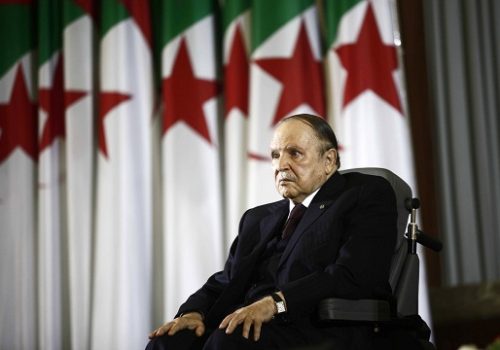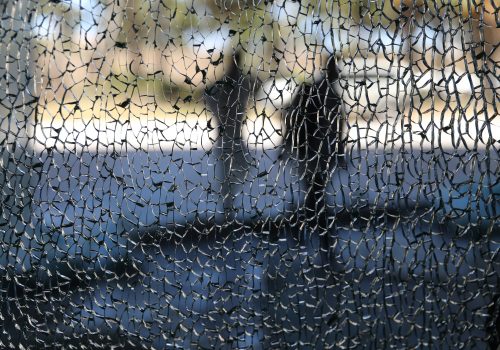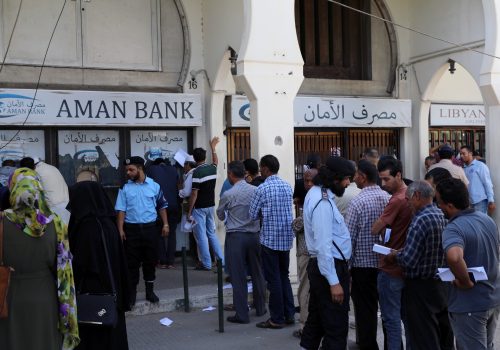Why Algeria is suddenly more interested in Libya
After years of working quietly behind the scenes, Algeria has adopted a more assertive, if uneven, policy towards the war in neighboring Libya. In the latest dramatic move, Algerian Foreign Minister Sabri Boukadoum traveled to the east of Libya on February 5 to meet with aspiring strongman Khalifa Haftar, who in April 2019 began an offensive to take control of the Libyan capital Tripoli. However, Boukadoum appears to have been received at the airport by Abdelhadi Al-Hawij, the ‘foreign minister’ of the eastern parliament in Tobruk, causing diplomatic consternation.
The Tobruk parliament is a direct rival to the UN-backed government in Tripoli; the photo opportunity with Boukadoum seemed to confer a measure of recognition to the controversial parallel entity. As one European official exclaimed to the authors in an interview, “Algeria is not working within the international framework. Its policy is too obscure.” Boukadoum’s meeting with Al-Hawij is only the most recent in a series of awkward gestures by the new Algerian government in relation to the conflict in Libya. However, it is likely that Algeria’s policy towards Libya remains unchanged, and that these bold interventions are driven as much by domestic considerations as by the dynamics of the Libyan conflict itself.
Diplomatic asset
Haftar mounted his surprise Tripoli attack on April 4, 2019, only two days after Algeria’s President Abdelaziz Bouteflika was forced to resign by the military, touching off months of political uncertainty in that country. Bouteflika and his inner circle had wielded power for twenty years; his ouster was a bid to placate the hundreds of thousands of citizens who flooded public spaces across the country demanding sweeping reform. The Algerian military—fronted by army chief of staff Ahmad Gaid Salah—was caught off-guard by Haftar’s game-changing offensive in Libya, but it had a series of more pressing challenges to contend with at home.
At the same time, realignments within the regime itself impacted Algerian capacity towards Libya. For example, the chain of command within the intelligence apparatus shifted on at least two occasions and the heads of the internal and external security services were changed multiple times as a consequence of infighting related to the political reshuffle. Meanwhile, the battle for Tripoli was intensifying, with civilian casualties mounting, foreign arms shipments multiplying, and maritime competition between external actors escalating.
On December 13, 2019, Abdelmajid Tebboune—a regime insider—was declared the winner of Algeria’s presidential election, with no independent verification of voter turnout. The poll had been delayed by six months over the military’s fears of a mass boycott. Largescale protests continued as Tebboune was sworn into office, with activists denouncing him as “the chosen one”—a reference to his proximity to the all-powerful army chief, Gaid Salah. Days later, Salah died suddenly of a heart attack. The Algerian government then went into overdrive to shore up its legitimacy. In that task, the Libyan file was seen as a diplomatic asset.
The first international trip made by Tebboune was to the summit on Libya held in Berlin during January 19 – 20. The following week he received his first visit by a head of state: Turkish President Recep Tayyip Erdogan. Together, they agreed to implement the commitments made at the Berlin conference and establish peace in Libya ‘under Algerian-Turkish patronage’. Given that Turkey is a committed supporter of the UN-backed Government of National Accord (GNA) in Tripoli—having sent weapons, armed drones, and roughly two thousand fighters from Syria—Tebboune’s meeting with Erdogan was seen as telegraphing more aggressive support for the GNA. Indeed, on January 7, Tebboune declared Tripoli to be “a red line not to be crossed,” while receiving the head of the GNA in Algiers. This activated Haftar’s notorious disinformation machine, which duly began to spit out a range of anti-Algerian conspiracies since deleted, regarding covert weapons deliveries and secret agreements with Europe.
By the same token, when Boukadoum met with the parallel foreign minister from the eastern parliament, he was castigated by pro-GNA media and the GNA leadership rescinded his invitation to visit Tripoli. These recent miscalculations are part of an Algerian campaign for higher international visibility on Libya, geared, at least in part, towards domestic consumption.
Domestic audience
Algeria’s energetic engagement on Libya coincides with the one-year anniversary of the Hirak protest movement, which was marked on February 21. Protests are a weekly fixture now for waves of disillusioned Algerians: marches are held regularly in forty towns and cities, with hundreds of thousands of peaceful protesters reliably streaming through the streets of the capital on Tuesdays and Fridays.
The Hirak’s major weakness is that it is functionally leaderless; it has no formal political structure to tap into and no means through which to interface with the regime. As one activist told the authors, “the lack of a power center is the key to the Hirak’s resilience, but, when it comes to entering dialogue, this makes it deaf and dumb.” But its strengths are many, as demonstrated by its longevity. Its pacifism is engrained. By contrast, the regime continues to generate anger through arrests and heavy-handed tactics in demonstrations outside of Algiers. Moreover, while social media is ablaze, Algerian television, which is state-controlled, does not report on the countrywide rallies, suggesting a prevailing state of denial and dysfunction which further impacts government credibility.
Since the elections in December 2019, the momentum behind the protests, which had briefly ebbed, has gathered once more. In an interesting twist, after the sudden death of Salah, the slogans of the Hirak became directed towards Tebboune and the political establishment more than the military. This is intended to leave the door open for a more constructive relationship between the Hirak and the new army chief of staff, General Said Chengriha.
Tebboune’s Libya-related activity is bound up with this domestic challenge. In the first place, the string of high-level meetings is intended to position the new president as an important powerbroker with strong international relationships. Secondly, the aim is to underline the seriousness of a threat at Algeria’s borders, urging citizens to prioritize continuity and stability. Third, the regime urgently seeks to change the international narrative with regard to Algeria, away from popular anger and nationwide demonstrations, and towards headlines that take for granted the legitimacy of the government in Algiers. In that task, it has largely succeeded.
Undoubtedly, Libya is a critical national security issue for Algeria. Since the overthrow of Muammar Gaddafi in 2011, instability in Libya, with which it shares a 900-kilometer land border, has dominated the threat picture in Algeria. Between the expanding power vacuum and the proliferation of weapons, jihadi groups and foreign militants, the Libyan arena was troubling for Algeria. The indirect effects of the turmoil in Libya also presented enormous security challenges, including the major destabilization of Mali and the Sahel on Algeria’s southern flank. A series of terrorist attacks inside Algeria were linked to Libya and Mali. In fact, despite Algeria’s firm doctrine of non-intervention, since 2017 rumors have swirled about clandestine Algerian units conducting targeted counter-terrorism operations inside Libya.
Beginning in 2014, Algeria pursued a policy of quiet neutrality in Libya, while promoting inclusive dialogue and peacebuilding at the tribal level. One senior Libyan official told the authors he was continually amazed by the granular knowledge of Libyan communities displayed by diplomats within the Algerian foreign ministry. But Algeria’s bottom-up approach was ultimately thwarted by the host of external forces impacting the domestic situation in Libya, ranging from the surge in military activity by and on behalf of foreign powers to the ideological Salafist militias upending tribal authority structures.
Foreign military interference in Libya has overwhelmed local dynamics, taking on an escalatory logic of its own and marginalizing the inclusive, negotiated solution advanced by Algeria. Despite a UN arms embargo, cargo flights land at Libyan airports daily, carrying advanced weaponry, military advisors and fighters. Meanwhile, through its alliance with Haftar, France—which has a long and brutal colonial history in Algeria—is spreading its influence towards Algeria’s immediate perimeters to the east.
In a bid to manage this swell of activity at its border, it makes sense for Algeria to seek a leading role in the Libyan crisis. Despite recent misjudgments, it seems Algeria remains committed to fostering compromise and political dialogue in order to underwrite long-term stability in Libya. However, if the Libya dossier becomes a useful foil against domestic opponents, the regime may increasingly resort to cavalier behavior. This would risk Algeria’s role as an independent mediator, and possibly undermine the UN process in Libya. As one Hirak organizer told the authors, “Libya is a delicate international subject. The timing is definitely good for Tebboune, but diplomatic warfare is very risky.”
Dr. Alia Brahimi is a specialist in the politics of the Middle East and North Africa. She is also a former research fellow at Oxford University and the London School of Economics.
Akram Kharief is a journalist and analyst focusing on defense and security in the Middle East and North Africa.
Image: Algerian Foreign Minister Sabri Boukadoum speaks during a news conference after a meeting with foreign Ministers and officials from countries neighboring Libya to discuss the conflict (Reuters)


